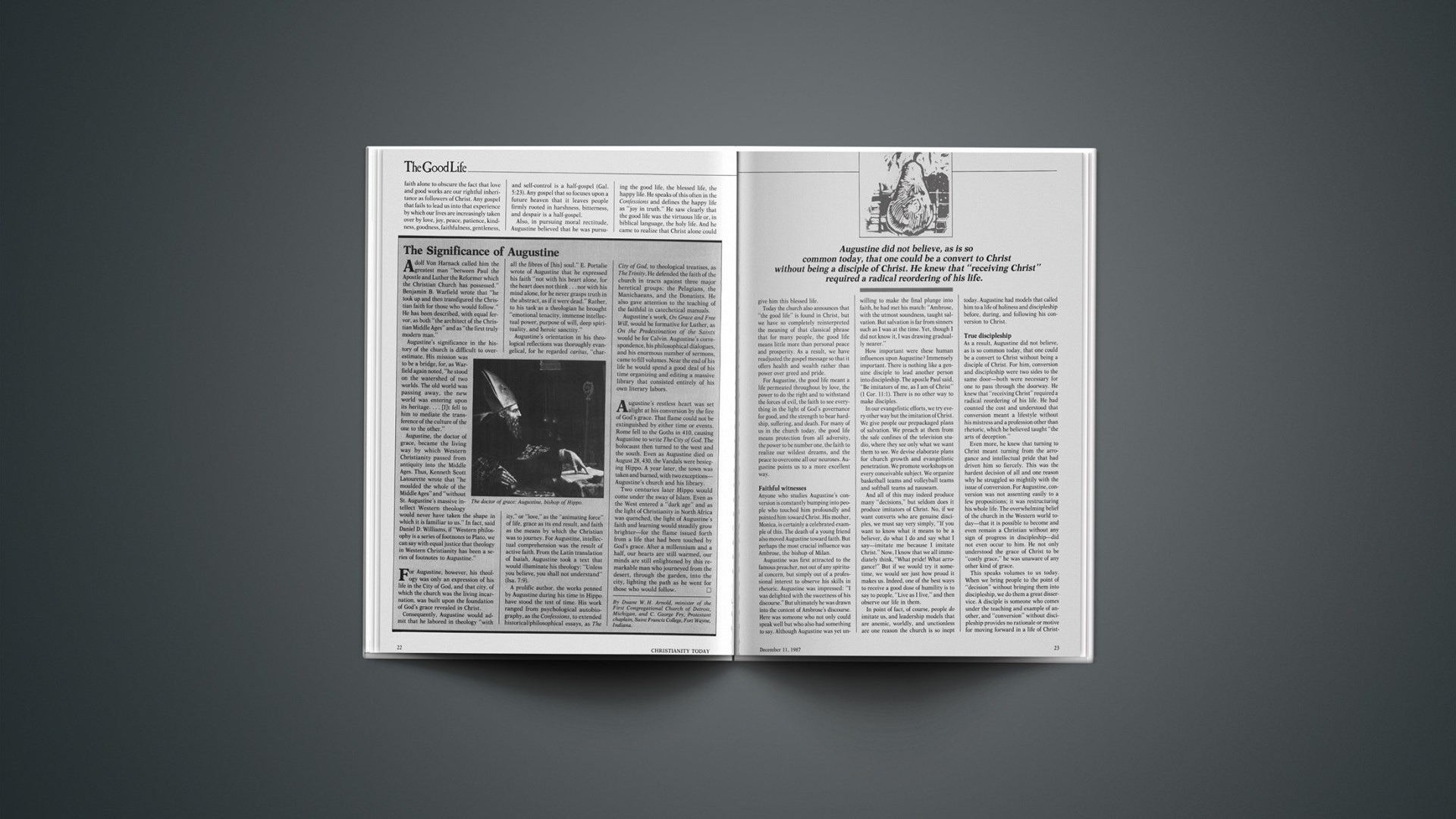Adolf Von Harnack called him the greatest man “between Paul the Apostle and Luther the Reformer which the Christian Church has possessed.” Benjamin B. Warfield wrote that “he took up and then transfigured the Christian faith for those who would follow.” He has been described, with equal fervor, as both “the architect of the Christian Middle Ages” and as “the first truly modern man.”
Augustine’s significance in the history of the church is difficult to overestimate. His mission was to be a bridge, for, as Warfield again noted, “he stood on the watershed of two worlds. The old world was passing away, the new world was entering upon its heritage.… [I]t fell to him to mediate the transference of the culture of the one to the other.”
Augustine, the doctor of grace, became the living way by which Western Christianity passed from antiquity into the Middle Ages. Thus, Kenneth Scott Latourette wrote that “he moulded the whole of the Middle Ages” and “without St. Augustine’s massive intellect Western theology would never have taken the shape in which it is familiar to us.” In fact, said Daniel D. Williams, if “Western philosophy is a series of footnotes to Plato, we can say with equal justice that theology in Western Christianity has been a series of footnotes to Augustine.”
For Augustine, however, his theology was only an expression of his life in the City of God, and that city, of which the church was the living incarnation, was built upon the foundation of God’s grace revealed in Christ.
Consequently, Augustine would admit that he labored in theology “with all the fibres of [his] soul.” E. Portalie wrote of Augustine that he expressed his faith “not with his heart alone, for the heart does not think … nor with his mind alone, for he never grasps truth in the abstract, as if it were dead.” Rather, to his task as a theologian he brought “emotional tenacity, immense intellectual power, purpose of will, deep spirituality, and heroic sanctity.”
Augustine’s orientation in his theological reflections was thoroughly evangelical, for he regarded caritas, “charity,” or “love,” as the “animating force” of life, grace as its end result, and faith as the means by which the Christian was to journey. For Augustine, intellectual comprehension was the result of active faith. From the Latin translation of Isaiah, Augustine took a text that would illuminate his theology: “Unless you believe, you shall not understand” (Isa. 7:9).
A prolific author, the works penned by Augustine during his time in Hippo have stood the test of time. His work ranged from psychological autobiography, as the Confessions, to extended historical/philosophical essays, as The City of God, to theological treatises, as The Trinity. He defended the faith of the church in tracts against three major heretical groups: the Pelagians, the Manichaeans, and the Donatists. He also gave attention to the teaching of the faithful in catechetical manuals.
Augustine’s work, On Grace and Free Will, would be formative for Luther, as On the Predestination of the Saints would be for Calvin. Augustine’s correspondence, his philosophical dialogues, and his enormous number of sermons, came to fill volumes. Near the end of his life he would spend a good deal of his time organizing and editing a massive library that consisted entirely of his own literary labors.
Augustine’s restless heart was set alight at his conversion by the fire of God’s grace. That flame could not be extinguished by either time or events. Rome fell to the Goths in 410, causing Augustine to write The City of God. The holocaust then turned to the west and the south. Even as Augustine died on August 28, 430, the Vandals were besieging Hippo. A year later, the town was taken and burned, with two exceptions—Augustine’s church and his library.
Two centuries later Hippo would come under the sway of Islam. Even as the West entered a “dark age” and as the light of Christianity in North Africa was quenched, the light of Augustine’s faith and learning would steadily grow brighter—for the flame issued forth from a life that had been touched by God’s grace. After a millennium and a half, our hearts are still warmed, our minds are still enlightened by this remarkable man who journeyed from the desert, through the garden, into the city, lighting the path as he went for those who would follow.
By Duane W. H. Arnold, minister of the First Congregational Church of Detroit, Michigan, and C. George Fry, Protestant chaplain, Saint Francis College, Fort Wayne, Indiana.










